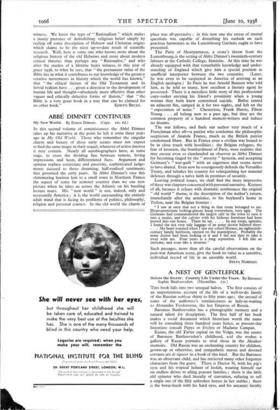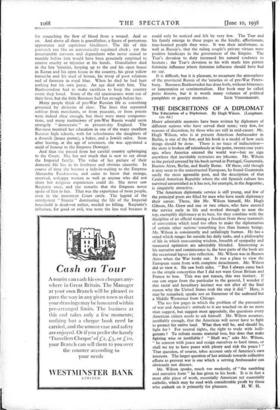A NEST OF GENTLEFOLK
Tim book falls into two unequal halves. The first consists of an unpretentious account of the life of a well-to-do family of the Russian noblesse thirty to fifty years ago; the second of some of the authoress's reminiscences as lady-in-waiting to Alexandra Feodorovna, the last Empress of Russia.
Baroness Buxhoeveden has a photographic memory and a natural talent for description. The first half of her book makes a social document which historians worth the name will be consulting three hundred years hence, as present-day historians consult Pepys or Evelyn or Madame Campan.
Kazan, the old Tartar capital on the Volga, was the centre of Baroness Buxhoeveden's childhood, and she evokes a gallery of Kazan portraits to rival those in the Aksakov memoirs. Old Russia was an enchanting country for children, grown-up or otherwise, and sympathetic nurses and devoted servants are de rigueur in a book of this kind. But the Baroness was an observant child, and has retrieved many other forgotten characters from the grave. There is Doctor N, with his pig's eyes and his tropical helmet of loofah, wearing himself out on endless drives to ailing peasant families ; there is the little old spinster who died literally of starvation, refusing to sell a single one of the fifty unbroken horses in her stables ; there is the horse-leech with his hard eyes, and his uncanny faculty
for staunching the flow of blood from a wound. And so on. And above all there is grandfather, a figure of portentous appearance and capricious kindliness. The life of this patriarch ran like an autocratically regulated clock ; yet the innumerable servants and dependants who never ceased to tremble before him would have been genuinely surprised to receive cruelty or injustice at his hands. Grandfather died in the late 'nineties, keeping up to the end his open house in Kazan and his open house in the country, his great yellow barouche and his stud of horses, his troop of poor relations and of footmen in royal blue. When he died he had hurt nothing but his own purse. An age died with him. The Buxhocvedens had to make sacrifices to keep the country estate they loved. Some of the old spaciousness went out of their lives, but the little Baroness had fun enough before her.
Many people think of pre-War Russian life as something governed by divisions of class. The lines that separated noblesse from merchants, or from peasants, or from priests were indeed clear enough, but there were many compensa- tions, and many institutions of pre-War Russia would seem strangely " democratic " in present-day England. The Baroness received her education in one of the many excellent Russian high schools, with for schoolmates the daughters of a dvornik (house porter), a baker, and a Jewish tailor. Soon after leaving, at the age of seventeen, she was appointed a maid of honour to the Empress Dowager.
And thus she passed from her careful country upbringing to the Court. She has not much that is new to say about the Imperial family. The value of her picture of their domestic life lies in its freshness and obvious sincerity. In course of time she became a lady-in-waiting to the Empress Alexandra Feodorovna, and came to know that strange, reserved, unhappy woman as well as anyone who did not share her religious experiences could do. She never saw Rasputin once, and she remarks that the Empress never spoke of him to her. That was the experience of most people, even in the innermost Court circle. The legend of the omnipotent " Staretz " dominating the life of the Imperial household is dead—or rather, needed no killing. Rasputin's influence, for good or evil, was none the less real because it could only be noticed and felt by very few. The Tsar and his family emerge in these pages as the kindly, affectionate, true-hearted people they were. It was their misfortune, as well as Russia's, that the ruling couple's private virtues were positive handicaps in the government of the Empire. The Tsar's devotion to duty increased his natural tendency to hesitate ; the Tsar's devotion to his wife made him permit feminine influence where feminine influence should have had no say.
It is difficult, but it is pleasant, to recapture the atmosphere of the provincial Russia of the 'nineties or of pre-War Peters- burg. Baroness Buxhoeveden has done both, without bitterness or lamentation or sentimentalism. Her book may be called petite histoire, but it is worth many volumes of political
pamphlets or gossipy memoirs. IGOR VINOGRADOFF.











































 Previous page
Previous page